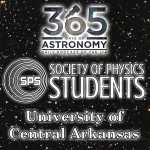Podcaster: Dr. Sarah Horst
 Title: Titan as Prebiotic Chemical System
Title: Titan as Prebiotic Chemical System
Organization: The Society of Physics Students (SPS) at The University of Central Arkansas
Link : The Society of Physics Students (SPS) at The University of Central Arkansas
Description: Saturn’s largest moon, Titan, is one of the most interesting places in the Solar System to study prebiotic chemistry. The atmosphere is rich in organic chemistry, including a thick global haze layer and the surface is covered by hydrocarbon seas and organic dune fields. I give an overview of some of the major discoveries about Titan from the Cassini-Huygens mission and discuss ongoing work to understand Titan’s atmospheric chemistry.
Bio: The Society of Physics Students (SPS) at The University of Central Arkansas is incorporates outreach, demonstrations, tutoring and guest speakers into our SPS Chapter.
Dr. Sarah Horst is an Assistant Professor in the Department of Earth and Planetary Sciences at Johns Hopkins University
Today’s sponsor: This episode of “365 Days of Astronomy” is sponsored by — no one. We still need sponsors for many days in 2016, so please consider sponsoring a day or two. Just click on the “Donate” button on the lower left side of this webpage, or contact us at signup@365daysofastronomy.org
End of podcast:
365 Days of Astronomy
=====================
The 365 Days of Astronomy Podcast is produced by Astrosphere New Media. Audio post-production by Richard Drumm. Bandwidth donated by libsyn.com and wizzard media. You may reproduce and distribute this audio for non-commercial purposes. Please consider supporting the podcast with a few dollars (or Euros!). Visit us on the web at 365DaysOfAstronomy.org or email us at info@365DaysOfAstronomy.org. This year we will celebrate more discoveries and stories from the universe. Join us and share your story. Until tomorrow! Goodbye!

